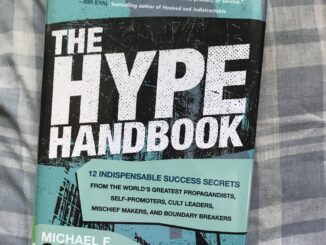
By Roger von Oech
Hardcover, 200 pages, 2022.
John Wiley & Sons
This is consistent with Wiley’s reputation for publishing self-promotional books for small businesses in wide-spaced, big fonts, peppered with quotations to barely fill 191 pages.
But the sensible content has better quality than most seemingly self-published Wiley books. For one, the writing is clear and free of mistakes, thanks to the obvious work of a good editor. They also used quality smooth paper to heighten the disturbing drawings. To hit 200 pages, there is a bibliography at the end all the way from 1494 (is that even in print?).
What is Roger selling? The idea that you should question everything and go against the crowd. Like that annoying guy Tom Hanks played in “Big” who said in a corporate meeting, “I don’t get it.” And that was enough to win him the CEO’s favor after they played chopsticks on a giant keyboard in a giant toy store. Which proves that if you’re Tom Hanks, you can be your Own Man.
This is a quick read to whet your appetite to know more, but there really isn’t much more to being oppositional. Just don’t follow grammatical rules and “Think Different” even if you call yourself a fruit.
To keep the book’s usefulness after you scan it in an hour, Roger wants you to randomly open a passage when you have a problem. And who hasn’t asked the Universe to give us signs through innocuous means like tea leaves and Tarot cards?
Maybe if you have the budget, you can hire Roger to “train” your workers to be more annoying —I mean contrarian. That would work if they cared to jeopardize their jobs and risk the ire of their “progressive” boss.
Still, I got several good ideas and confirmation of my biases from this book. But I was born an unfeeling fool who cannot control my impulse to speak the truth. So for me, it doesn’t pay to be the Bad Guy, unless you want a career in activism, law, journalism, or comedy (I tried three of those).
Sure there are the geniuses and innovators, but they’re such a minuscule number in history that it’s unlikely we can simulate their thinking or success. At the very least, borrow this book from your library to nudge your mental complacency.
@IvyDigest
.
.






